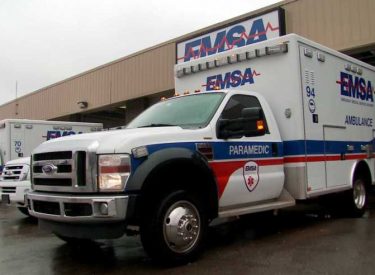‘The system failed us’ – Family on EMSA ambulance delay
Mike Seals - January 26, 2021 12:04 am

by Ali Meyer
OKLAHOMA CITY (KFOR) –The largest ambulance service in the Oklahoma City metro is battling very slow response times.
The problem is causing trouble for first responders who are often left waiting for an ambulance to arrive in an emergency.
News 4’s Ali Meyer has been investigating.
The Amme family was having Christmas Eve dinner on Dec. 24, 2020 when boiling hot oil from the family’s fondue pot spilled its contents.
The oil scalded Corey and Kristin Amme’s three-year-old daughter, Quinn.
“It was almost like the air just got sucked out of the room,” said Corey Amme.
They called 911.
Oklahoma City Fire Department (OCFD) Engine 34 arrived at the home within minutes.
Firefighters began to treat the baby girl for second degree burns.
“We kept asking, ‘How much longer? How much longer until they’re here?’” said Quinn’s mother, Kristin Amme. “We just had to sit there and wait and wait and wait.”
The Emergency Medical Services Authority (EMSA) ambulance was slow to respond.
Twenty minutes after firefighters arrived, the family said they could wait no longer.
They asked again and, according to Kristin Amme, the 9-1-1 dispatch center communicated the ambulance was still at least ten minutes away from the home.
A responding firefighter, an OCFD Major with 25 years experience, offered to drive the young patient and her mom to the hospital in the fire truck.
“I just never thought that it would come to something like that,” Corey said.
Quinn fell asleep in the fire truck as the Major drove her to INTEGRIS Baptist Hospital for treatment.
“I think he made a decision not only as a first responder and a firefighter, but as a father and a fellow Oklahoman,” Kristin said. “He made the best choice for the care of his patient.”
It’s been nearly a month since the accident with the fondue pot, and Quinn is now healing at home.
However, their hero may be facing consequences for stepping in to help in the way he did; transporting a patient to the hospital in a fire engine is against department policy.
“I really appreciate every decision he made when the system failed us by not having an ambulance here to do that job,” said Kristin.
The Amme family believes Quinn’s recovery will be complete because of the compassion of the firefighter who drove them to the hospital.
“That night, we really needed them (EMSA), and they just weren’t there,” said Corey. “To the fire department, we can’t thank them enough.”
Records provided by EMSA show 40 times in December 2020, the ambulance service took longer than an hour to get to the scene.
“We make no bones about it,” said EMSA Chief of Operations John Graham. “We want to be transparent. We have nothing to hide. We are struggling like many, many ambulance services.”
EMSA blames low staffing, emergency room delays and time-consuming decontaminating for COVID-19 transports.
EMSA admits there are fewer ambulances in service right now, which means more and more ambulances are being dispatched from a hospital instead of a community post.
“They’re too far away. You’re still getting that ambulance, but it’s taking too long because they’re out of position,” said Graham.
According to EMSA, this is a significant contributing factor to delayed response times.
“(The ambulances) are responding from the hospitals, which may be 15 or 20 miles from the normal location where the ambulance waits to be called,” said Deputy City Attorney Wiley Williams, who is also the Chairman of the EMSA Board.
EMSA is a public trust which has historically been operated by a private company.
That arrangement changed recently when EMSA and their contracted operator, American Medical Response (AMR), parted ways.
The termination of the operating contract ended in an explosive lawsuit alleging mismanagement and breach of contract.
EMSA took over operations of the ambulance service December 1, 2020.
But it has been a rough transition, complicated by COVID-19.
“(EMSA) is keeping the council and fire chief and the city manager very informed about what response times are, and we know they’re slow,” Williams said. “A surge has happened, and it has made it very difficult. It would have been very difficult even with AMR in place.”
The EMSA board has approved $5,000 and $10,000 bonuses for new EMTs and paramedics.
They are desperately trying to fill open positions and reverse the trend of slow response times.
“Their performance was embarrassing,” said Kristin. “(EMSA) should be embarrassed. They should feel bad that they failed.”
The EMSA delay put a partner agency in a tricky position about how to help.
Oklahoma City Fire Department officials refused to provide any records of the EMS call to the Amme’s home because the department is conducting an internal investigation into the firefighter who helped.
The investigation will determine if the OKCFD Major will be disciplined for driving the family to the hospital, which is against department policy.
The City of Oklahoma City and EMSA are both staying quiet about this call for now.
A spokesperson for Oklahoma City said, “We need to let (OKCFD) complete their review of the call before we can provide an informed statement.”



